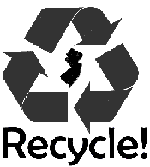Home > Divisions > Agricultural and Natural Resources > Natural Resources Conservation > New Jersey Pesticide Container Collection Program Guide
New Jersey Pesticide Container Collection Program Guide

This program is offered to agricultural, professional and commercial pesticide applicators who hold a NJDEP pesticide license. State, county and municipal government agencies may also participate. A representative from the New Jersey Department of Agriculture will be on-site to inspect the containers and issue one core credit to pesticide license holders who follow all of the required processing steps. To receive credit, participants must bring their pesticide license to the collection site and must follow all of the processing steps. Core credits will not be issued to participants who fail to follow all of the pesticide container processing steps.
- Plastic Pesticide Container Processing Steps and Size Limits
- Items that Will Not Be Accepted and Will Be Returned to the Participant
- Non-Waxy Cardboard Collection
- Other Rigid Plastic Recycling
- Plastic Pesticide Container Processing Steps and Size Limits
- All pesticide containers must be either triple rinsed or pressure rinsed, drained and dry inside;
- All pesticide containers must be free of residue (other than stains);
- The booklet must be removed (it is not necessary to remove the paper labels glued to the container);
- Foil seal must be removed;
- Only non-refillable pesticide containers will be accepted – you must drill a ¼-inch hole in the bottom of the container or with a utility knife make a 6-inch slit in the bottom of the container so the container will not hold liquids;
- Only pesticide containers embossed with HDPE or the recycling #2 will be accepted;
- Pesticide containers up to 55-gallons in capacity will be accepted. 5-gallon pales must be cut in half; 30-gallon containers into at least 4 pieces; and 55-gallon containers into at least 8 pieces. This can be accomplished using a sawszall, chainsaw, circular saw, or reciprocating saw. It is not necessary to cut up containers less than 5-gallons; and
- Pesticide containers must have originally held an EPA registered pesticide.

- Items that Will Not Be Accepted and Will Be Returned to the Participant
- Pesticide containers with dried formulation on the container, pour spout or the spout threads;
- Pesticide containers with any liquid residue;
- Pesticide containers where the insides are caked with dried residue;
- Mini-bulk, saddle tanks and nurse tanks, which can be made of fiberglass;
- Pesticide containers with lids; or
- Containers that held any type of petroleum oil product or antifreeze.

- Non-Waxy Cardboard Collection
Atlantic and Salem County collection sites: Helena Chemical will also be accepting, at no charge, non-waxy cardboard since their products are sold to the end users in cardboard boxes. Every Friday during the months of April through October from 1 p.m. to 3 p.m and during the scheduled pesticide container collection times, cardboard will be accepted. The clean non-waxy cardboard must be broken down and flattened. Cardboard delivered to the Atlantic County site must be tied. Clean Non-waxy cardboard will also be accepted year-round at the Cumberland County Solid Waste Complex’s Convenience Center.

- Other Rigid Plastic Recycling
If you generate other clean non-petroleum containing HDPE plastic (crates, buckets, pails, etc.), the Cumberland County collection site may accept the material. Contact the NJDA, 609-292-5532, or the Cumberland County Improvement Authority at 856-825-3700 to see if the plastic can be recycled. If you have large plastic containers that you cannot cut up, contact the NJDA to see if accommodations can be made to accept them at one of the sites.



